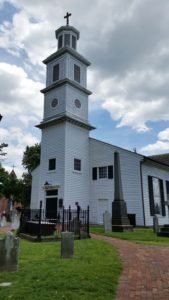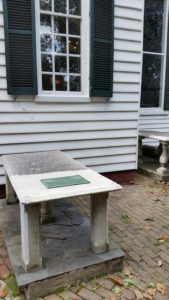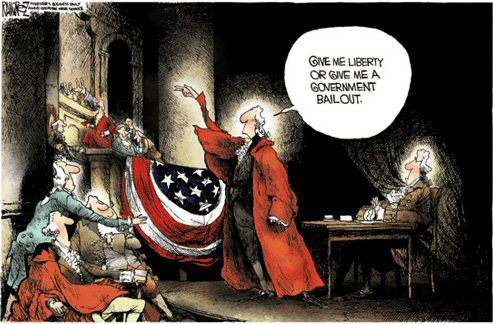In this time of our political angst, it’s always nice to look back at how America’s Founders reacted to a tough situation and displayed courage. One of the key moments in the months leading to the outbreak of the American Revolution was a speech given by Patrick Henry.
 The Virginia legislature had been sent home by the royal governor. The members had to meet somewhere else to discuss what to do in light of the terrible Coercive Acts that had been passed recently by Parliament. They chose to go upriver from Williamsburg, the capital, and meet in Richmond.
The Virginia legislature had been sent home by the royal governor. The members had to meet somewhere else to discuss what to do in light of the terrible Coercive Acts that had been passed recently by Parliament. They chose to go upriver from Williamsburg, the capital, and meet in Richmond.
The site for Henry’s speech was St. John’s Church. No one worried that they were discussing political matters in a church; it happened all the time. Henry’s task that day, 23 March 1775, was to convince the legislators that they had to stand up to Britain’s oppression. The members were divided; some wanted to counsel patience, while others said the time for patience had passed after nearly 15 years of constitutional debate.
Henry was decidedly on the side of making preparations in case the royal governor attempted to impose even stricter controls on the colony. He felt it was his job that day to convince the others of the wisdom of that course of action. To do so, he pulled out all the stops in his rhetoric and his dramatic abilities.
While there is no transcript of Henry’s speech, those who heard it remembered it quite well, and we have at least the main points he made. It is one of the most famous speeches in all of American history. Here are some salient excerpts:
Should I keep back my opinions at such a time, through fear of giving offence, I should consider myself as guilty of treason towards my country, and of an act of disloyalty towards the majesty of Heaven, which I revere above all earthly kings.
Notice that he says his obligation before God comes before his obligation to his country. He continues,
Mr. President, it is natural to man to indulge in the illusions of Hope. We are apt to shut our eyes against a painful truth. . . . Is this the part of wise men, engaged in a great and arduous struggle for liberty? Are we disposed to be of the number of those who, having eyes, see not, and having ears, hear not, the things which so nearly concern their temporal salvation?
That excerpt shows how Henry interweaves Scripture with his oratory, knowing that his audience will know the source and will consider his words more seriously when he bases them on Scripture. His use of Scripture does not end there:
I wish to know what there has been in the conduct of the British ministry, for the last ten years, to justify those hopes with which gentlemen have been pleased to solace themselves and the House. Is it that insidious smile with which our petition has been lately received? Trust it not, sir; it will prove a snare to your feet. Suffer not yourselves to be betrayed with a kiss.
Nowadays, there would be many in the audience, even of legislators, who would not recognize the allusion to Judas betraying Jesus. Times have changed. Henry then goes into a direct appeal:
If we wish to be free; if we mean to preserve inviolate those inestimable privileges for which we have been so long contending; if we mean not basely to abandon the noble struggle in which we have been so long engaged, and which we have pledged ourselves never to abandon until the glorious object of our contest shall be obtained, we must fight! I repeat it, sir, we must fight! An appeal to arms, and to the God of hosts, is all that is left us.
Sir, we are not weak, if we make proper use of those means which the God of nature hath placed in our power. . . . Besides, sir, we shall not fight our battles alone. There is a just God who presides over the destinies of nations, and who will raise up friends to fight our battles for us.
He then becomes prophetic, as the Battle of Lexington and Concord will occur just a few weeks later:
It is in vain, sir, to extenuate the matter. Gentlemen may cry peace, peace, but there is no peace. The war is actually begun. The next gale that sweeps from the north will bring to our ears the clash of resounding arms. Our brethren are already in the field. Why stand we here idle? What is it that gentlemen wish? What would they have? Is life so dear, or peace so sweet, as to be purchased at the price of chains and slavery?
He ends with those stirring words that have been echoed ever since:
Forbid it, Almighty God! I know not what course others may take, but as for me, give me liberty, or give me death!
 Edward Carrington was a man who was standing outside the church listening to Henry’s speech. He was so inspired by it that he requested that his grave be on that very spot outside the window where he peered in and listened. That’s exactly what happened. You can go to St. John’s Church today and see Edward Carrington’s grave on that very spot.
Edward Carrington was a man who was standing outside the church listening to Henry’s speech. He was so inspired by it that he requested that his grave be on that very spot outside the window where he peered in and listened. That’s exactly what happened. You can go to St. John’s Church today and see Edward Carrington’s grave on that very spot.
Where are the principled politicians today? Where are the Patrick Henrys in our time?
Political courage seems to be at a low ebb. Concern for the Constitution and the rule of law are little more than slogans or clichés for most politicians.
Instead of courage, we have developed an entirely different mentality:

What a sad spectacle we have become. We need to draw inspiration once again from someone like Patrick Henry. May we regain our courage.
